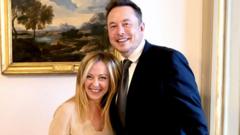Elon Musk's involvement in Italian migration policies has generated significant controversy, particularly after he criticized the Italian judiciary, stating, “these judges need to go,” in relation to the government's efforts to establish migrant detention centers in Albania. This statement was closely followed by a response from Italian President Sergio Mattarella, who emphasized the importance of respecting Italy's sovereignty and pointedly advised Musk against interfering in domestic matters.
The tension stems from a ruling by a Rome court that questioned the legality of detaining asylum-seekers in Albania, challenging Meloni's administration. Musk's connection with Meloni, who has adopted a hardline stance against illegal migration since her election, has raised eyebrows, especially as he prepares to assume a significant role in Donald Trump’s planned Department of Government Efficiency.
The controversial migrant centers in Albania, designed by the Italian government to decrease illegal migration by processing asylum-seekers nearer to their departure point, have become a focal point in the debate over Italy's immigration strategy. However, the implementation of these centers has faced hurdles, including legal setbacks and human rights concerns, resulting in empty facilities and reduced staffing.
As discussions heighten, Meloni and her supporters have actively criticized the judiciary, which they argue obstructs governmental attempts to curb migration. The legal landscape is further complicated by an October ruling from the EU's Court of Justice deeming that countries cannot be considered safe for the repatriation of migrants if any part of them is deemed dangerous. This endangers Italy's strategy of handling migrants and complicates the existing treaty with Albania.
Musk’s comments have not only intensified the political discourse in Italy but have also drawn attention from leaders in the UK and the European Commission, who observe Meloni’s policies as a potential model for curtailing irregular migration.
Despite the backlash against his public statements, Musk reportedly stressed that he respects President Mattarella, while insisting on his right to express his views, citing protections found in both the First Amendment and the Italian constitution.
Critics argue that Musk's commentary marks a dangerous trend of demonizing judicial actors, echoing previous strategies employed by political leaders like Silvio Berlusconi. The unfolding narrative surrounding Musk and Meloni’s alliance continues to highlight the intersection of international dialogue and national policy, further polarizing opinions on the management of migration in Italy and beyond.



















